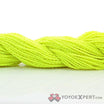Cheng something. I dont remmeber his last name.
It was Cheng, he did worlds last year too and he does AP every year
Perfectly said. One missed catch, free throw or a two man advantage (hockey) without scoring has cost championships. It’s the nature of competition. The best team all year often isn’t the team that wins the championship. Like they say, it’s why they play the game.
Right. That happens on every competition. Not always the best team/player wins.
Kind of makes it boring without risk. That’s why I really liked the 4A and Hajime Miura. He put it all on the line.
I’m just saying that you can’t say Evan only lost because he missed his two lacerations. He lost because he built those into his routine in the first place and didn’t end up hitting them. Every person that freestyles has to balance difficulty with consistency.
I also disagree that they are boring without risk. All of the routines have risky tricks in them, some are just more risky than others. And the elements that are easier are only easier because these guys have practiced and perfected their tricks so much that it’s not difficult for them hit consistently.
Regardless it’s still very high level yoyoing and I don’t see how it can be boring as long as the viewer appreciates how skilled the yoyoing is.
But it doesn’t have to be that way. And it probably shouldn’t be, at least not in any of our major sports.
The lesser team/player only wins a championship when the underlying structure of the contest methodology is compromised, at least in terms of the presumed goal of determining the “best” team/player for the season (and it isn’t a “championship” if the season consists of only one or two events).
The reason modern sports have become (mostly) invalid determiners of team/player superiority is that the needs of television ratings have taken priority over all other competitive concerns. As mentioned, Major League Baseball used to have a much more valid method of crowning a champion, back when the “pennant race” had statistical validity. In those days, the best team almost invariably won the pennant, and when it was a close race, it was usually close for the right reasons. The same was true of NASCAR before 2014 when an elimination-style playoff system was introduced into the Chase (you want to talk about statistical validity–name any other sport in which every team competes against every other team 36 times over the course of a season).
Unfortunately for yoyoing, it simply isn’t practical to adopt a statistically valid contest methodology, which means we just have to accept that any method we do use will be seriously flawed, and just enjoy the proceedings for what they are: an entertaining show (and occasionally, if we’re lucky, a glimpse into the future of the game, as it appears to have happened in 4a this year).
That’s why we can’t really apply the standards and expectations of major sports competitions to yoyoing. The only thing they have in common is that neither can afford to do what’s necessary to establish (or restore) statistical legitimacy.
I think yoyoing is better in this regard than most sports. Consistency of tricks is mostly based on practice, so whoever practices their tricks and finds the balance between consistency and difficulty is most likely to win.
It’s a contest, and it’s a performance. We can say we wish misses weren’t judged so harshly, so that players would go bigger, but watching someone go up on stage and miss half their tricks might not turn out to be so enjoyable.
You can say that harder tricks should be counted more. Maybe there is some merit to this, but I think this is build in. I’m not an expert on judging, but it does seem like players take the risk reward into account. Gentry gauged what kind of routine would give him the best chance, and performed it amazingly! Evan went with more risk, and also did an amazing job! In this particular instance, the higher risk didn’t pay off, but it was taken.
Hopefully judging is evolving along with the sport.
Contests are contests, and represent one aspect of yoing. There is more than enough content to watch people hit unbelievable tricks, and share cutting edge creative stuff. I think it’s fine to have them be two different aspects of our hobby.
Yeah that performance is a tour de force of skill and creativity. Shu Takada is a living legend.
i need nate’s fs.
I don’t know, even within major sports there’s so much random variance that you would have to compile results from at least a 5 season period to determine who the best team is. I think given that it’s fine to say the team who ended up seeded in the playoffs and then won the playoffs was the best team that season. Because even if they statistically didn’t perform the best that season they won when it mattered.
In the NHL you could have 9 players on your team have career high shooting percentages that are much better than their average and your starting goalie could have a career high save percentage that is much higher than his average. This random variance/luck could carry you to a Stanley Cup over a team that has had consistent, repeated high averages for multiple players on the team for years. So that team was better and didn’t need random variance to do well, but they still lost when it mattered even if it was because the other team is lucky.
When you’re at that high of a level of play for a salary cap sport where there are multiple team members impacting the game whose performance can vary from season to season, luck is going to be a deciding factor a lot of the time. As opposed to something like tennis where it’s 1 v 1 and only two people have an impact on the outcome and there are multiple big tournaments each year.
I think this a great discussion to have though. I’d say yoyoing leans more toward tennis than team sports, but again like you said there’s not a huge sample size within a given year. And there’s also the fact that even with a standard of evaluation judging is at least a little bit subjective.
He was outstanding! He was pumped for every competitor!
Man all this complaining about competition is getting old. If someone doesn’t like the format or the competition then don’t observe it. Champions are champions because they do what is neccessary to win when it is time to win. Defeat is heartbreaking, that’s the nature of it. Countless what ifs make no difference.
I believe that as a champion, if the format and judging system were different, Gentry as well as other champions would study and adjust and build the routine neccessary to win. Gentry seems to do that better than any one else right now.
Tom Brady is the goat, not the fastest or strongest, nor the best scrambler, or even the best athlete in almost any way you break it down. Guys out throw him every season, farther faster and more accurate. Other QB’s out run him, out scramble, and often times just look better and flashier. But Tom Brady does what is neccessary and dedicates everything to his health and performance. And everybody bashes him, yet he is older and has more rings than others.
Right now Gentry is that guy. Studies the game and dedicates everything to it. This is his full time career and life. He won fair and square. If the rules were different, he is probably capable of adjusting and adapting to build the best routine possible. That’s what makes him a champion.
I am at the same time not taking anything away from the other competitors. Evan is amazing as well and a champion. But unfortunately he did not build the right routine.
yuki was close too guys
The judging system is what it is. I don’t really know how we would make it better for 1a. And nobody ever gives any serious suggestions to change it. Gentry got the dub so that’s that. I think what we could use is a little more transparency in how the judges are clicking or scoring the freestyles. If we could see how the judges were clicking or giving out evals there’d probably be at least a little less fret about the scores.
Yuki still the champion in my heart tho
Ok. So like. When are these trick circle shirts dropping on here @AndreBoulay
I’ll get em online tomorrow (or Tuesday… it’s been a long couple days!), BUT only if it will promote people posting #trickcircle tricks and less complaints about judging…
All these top level competitors know how the scoring works. If you want a competition you need to have rules, some people play to the crowd and some play to the judges, but in the end it comes down to who knows how to win a contest.
Congrats to all the winners! And congrats to anyone who even made it to finals, the competition was intense this year!
This plz
I would argue that “when it mattered” was all season long, not just during a single event. When you use a single event to decide it all, that’s when statistics are telling you you’re doing it wrong.
Now I realize that performance during a season plays a somewhat meaningful role by seeding a team/player into the playoff brackets, but even that short-changes the accomplishments of the team during the season by treating all playoff contenders as though they had accomplished equivalent greatness during the season, when most of them did not. It essentially erases all meaningful record of the team’s relative accomplishments. (NASCAR tries to recognize regular season success by awarding bonus points that help protect the leading teams against early elimination in the playoff rounds, but that is still inferior to the old, much simpler system in which the team with the most points at the end of the season earned the title of champion.)
The old MLB pennant race system was more valid because the winner was the one with the best record at the end of the season, end of story. It made the decision based on the entire season’s worth of play and nothing else, which is as it should be if you are trying to crown a champion for that year/season. Otherwise you are merely crowning the champion of a single game (or short series of games). And statistically speaking, a single data sample is not significant enough to decide anything meaningful.
As for random variance, that’s why you need a season that is long so that averages smooth out the peaks and valleys that can skew the final results. It is also why games/sports with more scoring opportunities and high final scores are more valid than those with low opportunities/scores. Basketball, for instance, is tremendously more statistically valid than soccer (and all its low-scoring variants like hockey) or baseball.
Of course, yoyoing can’t hope to have a statistically valid competition structure, which is why we need to just enjoy these contests as entertainment (and community-building opportunities) and not as legitimate determiners of who is “best in the world”.











